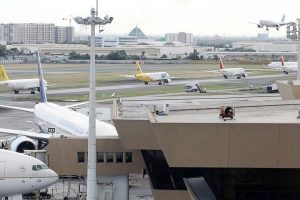Airlines call for smooth NAIA terminal transition; NNIC assures gradual shift
IMPLEMENTING terminal reassignments at Ninoy Aquino International Airport (NAIA) will need adequate time to ensure a smooth transition and minimal disruption to passengers, local airlines said on Tuesday. “To ensure a seamless transition with minimal disruption to passengers, a thorough consultative process and sufficient preparation time are essential for every terminal transfer,” Cebu Pacific said […]

IMPLEMENTING terminal reassignments at Ninoy Aquino International Airport (NAIA) will need adequate time to ensure a smooth transition and minimal disruption to passengers, local airlines said on Tuesday.
“To ensure a seamless transition with minimal disruption to passengers, a thorough consultative process and sufficient preparation time are essential for every terminal transfer,” Cebu Pacific said in a statement.
The Gokongwei-led budget carrier said discussions and coordination to transfer its flights from the Terminal 1 of Singapore’s Changi Airport to Terminal 4 took a year.
“This illustrates the critical need for comprehensive planning and cooperation in such transitions,” Cebu Pacific said.
According to the New NAIA Infrastructure Corp. (NNIC), the terminal reassignment is included in its “quick fixes” plan for NAIA, which will be implemented within three months to a year following its takeover on Sept. 14.
“Ultimately, what matters most is ensuring minimal disruption for passengers, especially during peak travel periods like Christmas, which is the busiest time of year for us,” Cebu Pacific said.
Under the terminal reassignment plan of NNIC, Terminal 1 will be designated for Philippine Airlines, Terminal 2 for domestic flights, Terminal 3 for all foreign airlines including Cebu Pacific and AirAsia Philippines’ international flights, and Terminal 4 for AirAsia Philippines’ domestic operations.
“Such terminal reassignment requires careful planning, including time and motion studies, consideration of environmental factors, and adequate time for implementation to minimize disruptions, especially as we are also nearing the peak season,” AirAsia Philippines said.
For flag carrier Philippine Airlines, the terminal reassignment should be further studied.
“We just need to identify the pros and cons of transferring to a terminal. And then if there will be cons that can be addressed, we can work it out together. I think that’s the most reasonable timeline to transfer,” PAL President and Chief Operating Officer Stanley K. Ng said.
GRADUAL IMPLEMENTATION
“Any future changes or improvements, including terminal reassignments, will be implemented gradually and strategically,” NNIC said in a statement.
NNIC General Manager Angelito A. Alvarez said these changes are part of a broader plan to modernize the airport and elevate the overall passenger experience.
“The standard objective for assignment in multi-terminal airports is to ensure, as much as possible, for each airline to be in one terminal to make flight connections easy,” said Nigel Paul C. Villarete, senior adviser on public-private partnership at the technical advisory group Libra Konsult, Inc.
He said bigger airlines or those with higher daily frequencies must be assigned first followed by smaller carriers or those with lesser daily number of flights.
“Of course, you need to consider the international and domestic flights because these need customs and immigration facilities,” Mr. Villarete said. — Ashley Erika O. Jose












